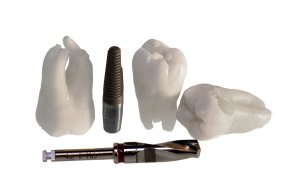-
The Importance of Visiting the Dentist
Home dental care is crucial for preventing cavities and gum disease. As this video explains, seeing a dentist is an equally important part of oral health. Dr. Spalitto of West County Dental is an excellent St. Louis dentist with more than a decade of experience.
While brushing and flossing reduce the formation of plaque, they don’t entirely prevent the buildup of this harmful substance. Once plaque hardens into tartar, the only way to remove it is via a professional teeth cleaning. Dental exams can also reveal the presence of tooth decay and periodontal disease, which can cause extensive tooth and gum damage. Dr. Spalitto can also detect the warning signs of oral cancer—a life-threatening condition. For the sake of your oral health, make it a priority to visit West County Dental at least twice each year.
-
The Truth Behind Common Root Canal Myths
 Dr. Spalitto’s primary goal is to brighten your smile. Unfortunately, tooth decay can seriously compromise this goal. Advanced tooth decay may require a root canal, which is a routine procedure addressing cavities that reach the tooth’s interior. As invaluable as root canals are to dental health, many people misunderstand the procedure’s place in professional dental care. Recognizing the necessity and benefits of a root canal can help you better understand this type of treatment.
Dr. Spalitto’s primary goal is to brighten your smile. Unfortunately, tooth decay can seriously compromise this goal. Advanced tooth decay may require a root canal, which is a routine procedure addressing cavities that reach the tooth’s interior. As invaluable as root canals are to dental health, many people misunderstand the procedure’s place in professional dental care. Recognizing the necessity and benefits of a root canal can help you better understand this type of treatment.Myth: Root Canals Damage Teeth
When Dr. Spalitto performs a root canal, he creates a small hole that reaches the inside of the tooth. Through this hole, he can extract infected tissues from the tooth interior. While this hole may very slightly compromise the overall strength of the tooth, an untreated infection can cause considerably more damage. If an infection is left to fester, it will affect not only your tooth, but also the surrounding gum tissue and bone. Root canals both stop infections and preserve the integrity of teeth.
Myth: Tooth Infections Can Heal Without Root Canals
Doctors often prescribe antibiotics to eliminate infections in the body. Once bacteria reach the interior of a tooth, however, affected tissues will continue to decay until Dr. Spalitto manually extracts them. During root canal therapy, Dr. Spalitto might introduce medication that can kill lingering bacteria, but the only way to fully address a tooth infection—short of tooth extraction, that is—is through a root canal.
Myth: Root Canals Hurt
Severe procedural pain is perhaps one of the most prevalent misconceptions about root canals. In fact, a root canal is a minimally invasive procedure that is more comfortable than you might imagine. Dr. Spalitto always has the comfort of his patients in mind when providing treatment; if you require a root canal, Dr. Spalitto will administer pain relief agents to block discomfort during the procedure. If you normally experience dental anxiety, he can also offer sedation dentistry services to relax you as you undergo treatment. This will allow you to get the care you need without pain or stress.
-
What to Expect from Your Child’s Dental Visit
 You can schedule an appointment for your child with a family dentist in West County of St. Louis as soon as his or her first tooth begins to grow. Taking care of your child’s teeth and gums plays a crucial role in ensuring your child is off to a healthy start in life. If your child develops a dental disease that is left untreated, he or she can suffer serious oral health problems, including gum disease.
You can schedule an appointment for your child with a family dentist in West County of St. Louis as soon as his or her first tooth begins to grow. Taking care of your child’s teeth and gums plays a crucial role in ensuring your child is off to a healthy start in life. If your child develops a dental disease that is left untreated, he or she can suffer serious oral health problems, including gum disease.Daily brushing, good nutrition, and regular dental visits can all help prevent dental disease and cavities. Children learn healthy dental habits from their parents and caregivers, so it’s important to be a positive role model and continue to schedule your own appointments with the dentist. At your child’s first appointment, your family dentist will learn about your child’s health history and conduct a complete oral exam. This allows your dentist to check the growth and development and detect any oral health issues. Your dentist will also clean your child’s teeth and provide suggestions for daily dental care. He or she can also tell you if your child is getting enough fluoride.
-
The Benefits of Dental Implants
 Compared to other options for restoring missing or damaged teeth, dental implants in West County of St. Louis are often the first choice among dentists and dental patients. While other tooth restoration options can interfere with eating, smiling, and speaking, dental implants function like natural teeth. With proper care, dental implants can also last more than 10 years, so they offer a long-term solution to maintaining oral health. Here’s a closer look at the benefits of dental implants.
Compared to other options for restoring missing or damaged teeth, dental implants in West County of St. Louis are often the first choice among dentists and dental patients. While other tooth restoration options can interfere with eating, smiling, and speaking, dental implants function like natural teeth. With proper care, dental implants can also last more than 10 years, so they offer a long-term solution to maintaining oral health. Here’s a closer look at the benefits of dental implants.Protect Healthy Bone
If you have lost one or more permanent teeth, leaving the empty spaces in your mouth can lead to additional health issues, including gum disease. In addition, you will no longer be using your jawbone in the affected area to support your natural teeth. As a result, the jawbone will begin to lose its strength and firmness. Dental implants actually preserve and stimulate the natural bone, which can help prevent loss of the jawbone.
Alleviate Anxiety
Your dentist’s office likely offers a range of tooth restoration options , including dentures. While dentures can effectively replace your missing teeth, you may find that you worry about them slipping. With dental implants, your tooth restorations stay permanently in your mouth just like natural teeth. This means you can brush, floss, and care for the implants in the same exact way you would care for your natural teeth.
Lower Cavity Risk
Dental implants may look like your natural teeth, but they can’t develop cavities like your natural teeth. However, you will still need to visit your family dentist regularly and care for your gums every day to help prevent other oral health issues.
Protect Healthy Teeth
In order to place a bridge in your mouth, your dentist will need to grind away the adjacent teeth. This process ends up damaging your healthy teeth in order to restore your missing teeth. The bridge is then attached to your modified healthy teeth for support. Dental implants, on the other hand, are placed directly into the jawbone without impacting the neighboring healthy teeth. Once in place, the implant helps prevent your healthy teeth from shifting into the empty gum space.
-
Taking Care of Your Child’s Teeth
 As soon as your child begins getting his or her baby teeth, it’s time to talk to your dentist in West County of St. Louis about proper care. These first teeth may not be permanent, but they help hold the space for adult teeth, so it’s still important to protect your child against tooth decay and gum disease. If your child does develop tooth decay, he or she may experience pain, difficulty chewing, and embarrassment talking or smiling.
As soon as your child begins getting his or her baby teeth, it’s time to talk to your dentist in West County of St. Louis about proper care. These first teeth may not be permanent, but they help hold the space for adult teeth, so it’s still important to protect your child against tooth decay and gum disease. If your child does develop tooth decay, he or she may experience pain, difficulty chewing, and embarrassment talking or smiling.Start with the First Tooth
Unfortunately, tooth decay is incredibly common among children. The U.S. Department of Health and Human Services estimates around one in two children develop decay in their baby teeth. While consuming sugary foods and drinks increases a child’s risk of developing tooth decay, healthy habits like brushing and flossing can help prevent this common childhood disease. As a parent, you should start cleaning your child’s baby teeth with a cloth or soft children’s toothbrush as soon as they begin erupting. You should clean these baby teeth after feeding and right before bedtime.
Encourage Regular Brushing
At age two, you can begin brushing your child’s teeth with fluoride toothpaste. You can start using fluoride toothpaste even earlier if your dentist recommends it. By age four or five, your child can start brushing his or her own teeth. However, you need to watch your child to ensure he or she actually brushes all of the teeth. For safety reasons, you should also make sure your child spits the toothpaste out, as swallowing too much fluoride can lead to white spots in adult teeth. Dentists recommend you continue watching your child brush his or her teeth until the age of seven or eight.
Take Your Child to the Dentist
By age one, your child should have already had his or her first dental checkup. If your family dentist doesn’t take young patients, you can ask your pediatrician to recommend a dentist who is good with kids. Visiting the dentist can be scary for children, so you may want to sit in the chair first and ask the dentist if your child can sit on your lap during the checkup.
-
Causes of Gum Recession
If your gums begin to recede, they will slowly lose tissue mass and expose the tooth nerves nestled beneath. This exposure can lead to pain and sensitivity, especially when consuming hot or cold foods and drinks. One way to prevent gum recession is to schedule regular dental cleanings in West County of St. Louis .
In this video, an experienced dentist describes the treatment options for gum disease. As she explains, ignoring the problem will lead to continued recession and other oral health issues, like cavities. While a dentist can help treat the condition through scaling and gum grafting, prevention is the key to treating gum recession. The best way to prevent gum recession is to brush twice a day, floss once a day, and schedule regular checkups at your family dentist office.
-
Tips for Coping with Dental Anxiety
 Varying levels of dental fear or anxiety are pretty common problems that keep far too many people from getting the oral care they need. If you struggle with these issues, keep reading to find out how sedation dentistry and other tactics can help you get past your doubts to get the care you need:
Varying levels of dental fear or anxiety are pretty common problems that keep far too many people from getting the oral care they need. If you struggle with these issues, keep reading to find out how sedation dentistry and other tactics can help you get past your doubts to get the care you need:Talk to Your Dentist
One of the most important things to do to quell your dental anxiety is to talk to your dentist. Be open about what scares you so he or she can make the necessary arrangements to make you as comfortable as possible in the office. If your dentist knows the root of your dental anxiety, he or she can make adjustments to give you what you need during your next visit.
Ask to See All of the Tools
A lot of people feel anxious at the dentist because they do not understand why all of the tools are used. If you fall into this category, you can ask the family dentist or the dental hygienist to talk to you about all of the tools and what they do. Once you understand their purpose, it helps you get past your dental anxiety and make it through your next appointment with ease.
Learn About Sedation Dentistry
If you have tried all of these other tactics and still feel really scared about going to do the dentist, you might want to ask about sedation dentistry. You can choose between various levels of sedation that help you relax enough to get the dental care you need. When you choose sedation dentistry in St. Louis, the dentist can give you nitrous oxide to make you feel calm but alert during the procedure. If you need something stronger, the dentist can do IV sedation, which is sent directly into your bloodstream to knock you out so you are completely unaware of the procedure. You can also opt for oral conscious sedation that is administered through oral medication.
-
Treating an Abscessed Tooth
An abscessed tooth is an infection in the pulp that can be treated with root canal therapy. The pulp of the tooth houses nerves and blood vessels that nourish the tooth. Tooth decay can reach the pulp and cause an infection.
Even a cracked tooth might lead to an abscess because it allows germs to reach the pulp. If you have an infection and your dentist in St. Louis decides to try root canal therapy, he or she will remove the infection and clean out the center of the tooth.
Once the infection is gone, the dentist will seal the tooth with a dental crown. Most root canal therapy can be completed in just 1-3 office visits. Check out this video to learn more.
-
The Stages of Gum Disease
 Periodontal disease is a serious oral health issue that can lead to negative side effects in your mouth and throughout the rest of your body. The best way to avoid gum disease is to truly understand it. Keep reading to learn about the different stages of periodontal disease and what you can do to prevent them:
Periodontal disease is a serious oral health issue that can lead to negative side effects in your mouth and throughout the rest of your body. The best way to avoid gum disease is to truly understand it. Keep reading to learn about the different stages of periodontal disease and what you can do to prevent them:Gingivitis
Gingivitis is the initial stage of gum disease. It happens when plaque develops at the gum line and causes inflammation. People with gingivitis usually notice bleeding, redness, or swelling in the gums when they brush or floss their teeth. You should schedule an appointment with your dentist in St. Louis as soon as possible if you notice any of these signs. Gingivitis does not cause permanent damage, which means it is reversible, but you have to get the proper treatment to stop it before it gets any worse.
Periodontitis
If your gingivitis is left untreated , it might develop into periodontitis. This more advanced stage of periodontal disease starts to attack the bone and fibers that keep your teeth in place. Once this damage begins, large pockets start to form beneath the gum line. Even more food and plaque can get stuck in these pockets, which puts you at a higher risk for more inflammation and damage. With the help of your dentist, you can find treatment that helps you manage your periodontitis and prevent it from getting any worse.
Advanced Periodontitis
If you do not treat periodontitis, it will advance into the final stage of periodontal disease, or advanced periodontitis. In this stage, the infection completely destroys the fibers and bones that keep your teeth in place. Without this foundation, your teeth might start to move around or even fall out. When your teeth move, it makes it more difficult to chew and talk. The infection in your mouth might also find its way into your bloodstream and increase your risk of heart disease, stroke, and other serious illnesses. Work closely with your dentist to keep your teeth and gums healthy and free from periodontal disease.
-
Take a Bite Out of Dental Anxiety with Sedation [INFOGRAPHIC]
Has fear been keeping you out of the dental chair? Don’t worry—you’re not alone. Millions of Americans have anxiety about going to the dentist, and many people in that group are so fearful that they never get dental care at all. Pretending your oral health needs don’t exist won’t make them go away, and in fact, ignoring them can lead to a long list of issues, from tooth loss to heart disease. The good news for patients with dental anxiety is that help is available in the form of sedation dentistry. Find out how sedation dentistry can revolutionize your dental office visit in this infographic from West County Dental. Our dental office serving St. Louis in West County is pleased to offer nervous patients sedation so they can develop a more positive outlook on dental care. Dental anxiety is so common that you’re sure to help many people by sharing this information, so please pass it on.
![Dental Anxiety with Sedation [INFOGRAPHIC]](https://www.westcountydental.com/wp-content/uploads/2020/04/WC-dental-Infographic5B15D.jpg)
RECENT POSTS
categories
- Uncategorized
- crowns
- dental veneers
- dentists
- full service dental practice
- porcelain veneers
- same day crowns
- Dental Cosmetic Surgery
- Dental Implants
- Dentistry
- Dentist Review
- Laser Dentistry
- Root Canal
- Sedation Dentistry
- Dentures
- Cleanings
- Teeth Whitening
- Abscessed Teeth
- Cosmetic Dentistry
- Infographic
- Cavities
- Sealants
- Gum Recession
- Periodontal Disease
- Dental Health
- Family Dentistry
- Dental Emergency
- Invisalign
- Filling
- Same Day Dental Procedures
- Gum disease
- Sleep Apnea
Archives
2022
2021
- December (2)
- November (1)
- October (3)
- September (2)
- August (2)
- July (2)
- June (2)
- May (2)
- April (2)
- March (2)
- January (2)
2020
2016
2015
- December (4)
- November (3)
- October (3)
- September (4)
- August (4)
- July (4)
- June (4)
- May (3)
- April (3)
- March (4)
- February (5)
- January (6)

